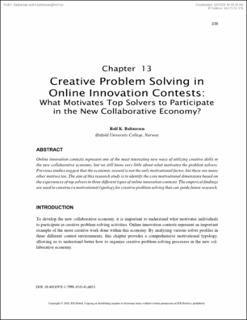| dc.contributor.author | Baltzersen, Rolf K. | |
| dc.contributor.editor | Leon, Ramona Diana | |
| dc.coverage.spatial | Hershey PA, USA | en_US |
| dc.date.accessioned | 2020-08-10T21:54:11Z | |
| dc.date.available | 2020-08-10T21:54:11Z | |
| dc.date.issued | 2020-07 | |
| dc.identifier.citation | Baltzersen, Rolf Kristian (2020). Creative Problem Solving in Online Innovation Contests: What Motivates Top Solvers to Participate in the New Collaborative Economy?, In Ramona Diana Leon (ed.), Strategies for Business Sustainability in a Collaborative Economy. IGI Global. | en_US |
| dc.identifier.isbn | 9781799845447 | |
| dc.identifier.uri | https://hdl.handle.net/11250/2671386 | |
| dc.description.abstract | Online innovation contests represent one of the most interesting new ways of utilizing creative skills in the new collaborative economy, but we still know very little about what motivates the problem solvers. Previous studies suggest that the economic reward is not the only motivational factor, but there are many other motives too. The aim of this research study is to identify the core motivational dimensions based on the experiences of top solvers in three different types of online innovation contests. The empirical findings are used to construct a motivational typology for creative problem solving that can guide future research. | en_US |
| dc.language.iso | eng | en_US |
| dc.publisher | IGI Global | en_US |
| dc.subject | Innovasjonskonkurranser | en_US |
| dc.subject | Motivasjon | en_US |
| dc.subject | Delingsøkonomi | en_US |
| dc.subject | Kollektiv intelligens | en_US |
| dc.title | Creative Problem Solving in Online Innovation Contests: What Motivates Top Solvers to Participate in the New Collaborative Economy? | en_US |
| dc.type | Chapter | en_US |
| dc.type | Peer reviewed | en_US |
| dc.description.version | publishedVersion | en_US |
| dc.rights.holder | Copyright © 2020 by IGI Global. All rights reserved. No part of this publication may be reproduced, stored or distributed in any form or by any means, electronic or mechanical, including photocopying, without written permission from the publisher. Product or company names used in this set are for identification purposes only. Inclusion of the names of the products or companies does not indicate a claim of ownership by IGI Global of the trademark or registered trademark. Library of Congress Cataloging-in-Publication Data
IGI Global supports a Fair Use Policy where under this policy you may utilize your final typeset PDF (which includes the title page, table of contents and other front materials, and the copyright statement) of your chapter or article of this publication (NOT the entire book or journal issue), in your teaching materials or post to your own secure personal website and/or university repository site. Under the Fair Use Policy, however, authors and editors ARE NOT authorized to upload their chapter, article, or full book publication or journal issue to open access sites, including, but not limited to: ResearchGate, Academia.edu, SSRN, arXiv, or any others. Doing so is considered a clear violation of the International Copyright Laws and violators could face legal consequences. | en_US |
| dc.subject.nsi | VDP::Samfunnsvitenskap: 200::Økonomi: 210 | en_US |
| dc.subject.nsi | VDP::Samfunnsvitenskap: 200::Psykologi: 260 | en_US |
| dc.subject.nsi | VDP::Samfunnsvitenskap: 200::Psykologi: 260::Organisasjonspsykologi: 268 | en_US |
| dc.subject.nsi | VDP::Samfunnsvitenskap: 200::Pedagogiske fag: 280 | en_US |
| dc.source.pagenumber | 239-264 | en_US |
